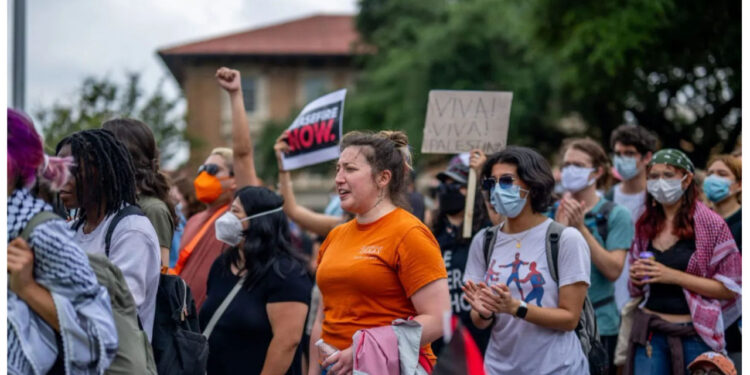Students at the University of Texas at Austin are expressing mixed opinions regarding the police crackdown that occurred on campus, resulting in the arrest of 57 individuals.
Protestors held up signs bearing various messages like “Save Gaza,” “Jews advocating for a Free Palestine,” and “Jay Hartzell is a Coward,” which was a direct reference to the president of UT Austin. The university’s iconic tower, which served as a constant reminder of the recent arrests, cast a shadow over the demonstrators.
According to The Texas Tribune, Travis County Attorney Delia Garza has dropped charges against 46 out of the 57 protesters arrested on Wednesday. Garza stated that all but 13 of the cases lacked probable cause.
According to local media sources, there were no indications of violence until authorities stepped in, using batons to subdue the students and pushing the protestors back.
According to Etai, a junior at UT Austin, the recent arrests have served as a wake-up call for people, making them realize that they cannot engage in unruly behavior without consequences. He shared that he witnessed protesters physically assaulting the police, throwing horse manure, and even hurling derogatory remarks at him, telling him to “go back to Poland.” This demonstration of support from pro-Israel students highlights the need for maintaining law and order during such protests.
Raneem, a senior at UT and member of the school’s Palestine Solidarity Committee, expressed that on Thursday, students were hesitant to gather due to the fear of facing the same level of force they had witnessed before. However, today, state troopers, helicopters, mace, and other means of force were not used aggressively against a group of students who were peacefully exercising their First Amendment rights.
According to her, the police detained a student leader on Wednesday while attempting to disperse the participants. She also mentioned that the police used pepper spray on the crowd and employed excessive force while forcefully putting them into police vehicles.
The arrests on Wednesday have caused grave alarm among the UT professors, as expressed in a letter from the Faculty Council.
According to him, peaceful protests that adhere to our rules are acceptable, but it is not allowed to break our rules and policies and disrupt others’ ability to learn.
According to the statement, there have been thirteen pro-Palestine free speech events at the University since October, which have mostly occurred without any issues. However, this particular protest aimed to disrupt the campus by occupying the lawn below the administrative building.
According to The Texas Tribune, the faculty council has rejected this response, and a faculty petition is currently circulating to hold a vote of no confidence against Hartzell.
The Faculty Council expressed their dissatisfaction with President Hartzell’s message to the community on Wednesday night, stating that it does not adequately justify the University’s actions.
“How can we expect our students or the general public to be tolerant of viewpoints they disagree with if we ourselves cannot set an example?”
Professor Kirsten “Kit” Belgum, an expert in the rise of German nationalism, expressed her agreement with the statement. During the demonstration on Thursday, she held a sign that boldly stated, “Education Needs Free Speech.” In an interview with The Hill, Belgum shared her reason for attending the protest, stating that she found the police response on Wednesday to be highly offensive.
“I’m not a fan of chanting in unison,” she stated, while a chorus of protesters passionately exclaimed, “Free, free Palestine” and “2-4-6-8 Israel is a racist state.”
Both the pro-Palestine protesters, who made up the majority of those gathered on Thursday, and the pro-Israel counterprotesters expressed a sense of unease and insecurity on campus.
According to Raneem, a passionate advocate for Palestine, the deployment of police on Wednesday is a cause for concern. She believes that this development should instill fear not only in the residents of Texas and the students of UT, but in the entire nation. Raneem asserts that our democracy is at stake, as our fundamental rights are being violated.
According to The Hill, pro-Israel counterprotesters expressed concerns about the potential chilling effect on their freedom of speech.
Gil, a senior affiliated with a pro-Israel group, shared with The Hill his concerns about the perceived anti-Israel bias in his Middle Eastern studies classes. He specifically mentioned an introductory Israeli history class he took last year, which was taught by a professor who is a Palestinian citizen of Israel.
During that class last year, Gil mentioned that he used to raise his hand frequently to correct the teacher. He explained that sometimes the teacher would make minor errors or forget to mention important details in the story.
He no longer feels at ease engaging in such activities. “Now I refrain from doing so because I have experienced instances where individuals in my classes would yell at me and label me as a Zionist,” he expressed.
Jewish opinion was split at the protests. Jewish Voices for Peace, an organization that opposes the occupation, showed their support for the Palestine Solidarity Committee by participating in both days of the protest. Many individuals in the crowd expressed their solidarity by donning kippot or wearing necklaces with the Hebrew word “chai,” which symbolizes life.
But like many instances of alleged antisemitism currently being discussed on college campuses, what made Etai and Gil feel unsafe was primarily the speech of other students. These students made statements in support of “intifada,” which is the Palestinian concept of uprising or shaking off, and referred to Hamas as a resistance movement.
If you’re looking for the most up-to-date news, weather updates, sports highlights, and streaming videos, make sure to visit The Hill.










